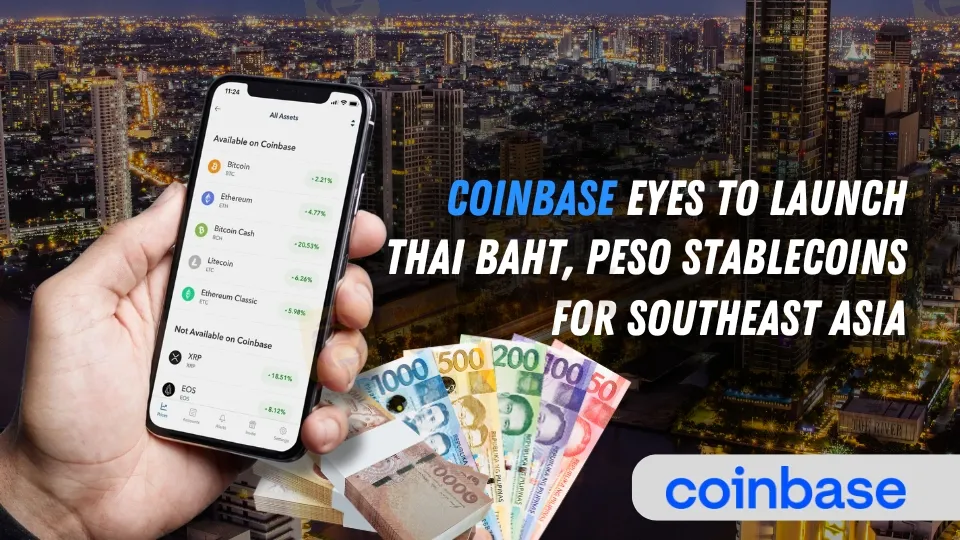简体中文
繁體中文
English
Pусский
日本語
ภาษาไทย
Tiếng Việt
Bahasa Indonesia
Español
हिन्दी
Filippiiniläinen
Français
Deutsch
Português
Türkçe
한국어
العربية
Coinbase Eyes to Launch Thai Baht, Peso Stablecoins for Southeast Asia
Abstract:Coinbase plans to introduce Thai baht and Philippine peso stablecoins, focusing on blockchain adoption in Southeast Asia. Learn how these will enhance digital finance.

Coinbase Targets Thai Baht, Peso Stablecoins in Southeast Asia
Coinbase, the global cryptocurrency leader, is focusing on launching stablecoins pegged to the Thai baht and Philippine peso to boost blockchain adoption in Southeast Asia. As reported by Nikkei Asia, the companys strategy does not involve direct entry into these markets. Instead, Coinbase will focus on its wallet business and Base blockchain platform to support local developers in creating solutions for the new stablecoins.
Jesse Pollak, Founder of Base and Head of Coinbase Wallet, emphasized that stablecoins pegged to local currencies would make transactions faster, cheaper, and more accessible. Bringing these currencies “on-chain” allows blockchain technology to simplify onboarding, offering seamless access to digital financial systems without forcing users to alter their relationship with money.
To drive innovation, Coinbase plans to hire country leaders in both Thailand and the Philippines. These leaders will collaborate with developers, regulators, and content creators to encourage blockchain adoption and integration of these stablecoins.

Stablecoins Gain Ground in Southeast Asia
Both Thailand and the Philippines have shown openness to stablecoins. In October, Thai regulators approved the first cross-border payment solution using stablecoins, while the Philippine central bank launched a peso stablecoin pilot earlier this year.
Pollak clarified that stablecoins are meant to modernize traditional financial systems, not replace national currencies. This vision was showcased at Devcon, an Ethereum-focused expo held in Southeast Asia, where participants converted dollar stablecoins to baht stablecoins without any foreign exchange fees. This was made possible through Rubie, a baht stablecoin wallet developed by Siam Commercial Bank (SCB) in partnership with Base.
SCB, working alongside Thai regulators, is evaluating the success of the pilot program to secure approval for a broader rollout of the stablecoin wallet. Stablecoins can also solve issues of financial inclusion, as demonstrated by Thailands PromptPay, which is accessible only to Thai nationals, leaving millions of annual tourists reliant on traditional currency exchanges and fees.
Pollak noted that stablecoins could ease this burden, creating smoother transactions for tourists and expatriates in the region.
Final Thoughts
Coinbases introduction of Thai baht and Philippine peso stablecoins represents a significant step toward enhancing digital financial systems in Southeast Asia. By leveraging blockchain and fostering local innovation, Coinbase aims to bring more accessible financial solutions to both local users and visitors. This development could have a lasting impact on financial inclusion, streamlining cross-border transactions and offering a new level of convenience for millions.

Disclaimer:
The views in this article only represent the author's personal views, and do not constitute investment advice on this platform. This platform does not guarantee the accuracy, completeness and timeliness of the information in the article, and will not be liable for any loss caused by the use of or reliance on the information in the article.
Read more

33,000 Jobs Lost Across the Private Sector in the US in June, Says ADP National Employment Report
The ADP National Employment report revealed 33,000 job losses across the private sector in the US during June 2025. Check out the job losses based on different sectors, regions and establishment type.

FCA Overhauls Rules on Non-Financial Misconduct in Financial Services
The FCA has launched a new consultation to strengthen rules against non-financial misconduct, aiming to align standards across the financial services industry and bolster public trust.

FxPro to Launch Crypto Trading Desk, Deepening Digital Asset Push
FxPro is expanding its crypto services by establishing a dedicated trading desk. This move signals a deeper commitment to digital assets beyond its current CFD offerings.

CFD Brokers Face Dual Compliance Pressures Ahead of 2026: Australia and EU Tighten Rules
CFD brokers are under increasing regulatory pressure as Australia and the EU introduce stricter rules. ASIC’s 2026 deadline requires updated adviser qualifications, while the EU Accessibility Act mandates inclusive digital design. Firms must act now to remain compliant and competitive.
WikiFX Broker
Latest News
Elon Musk's xAI raises $10 billion in debt and equity as it steps up challenge to OpenAI
European Central Bank's tightening cycle is done,' chief economist says
ACY Securities Expands Crypto CFD Offering with 24/7 Trading Access
Revelation: Makeup Artist, Social Media Influencer Involved in INR 1.62 Cr Forex Trading Scam
Social Trading Goes Mobile at M4Markets
Capital.com Strengthens UK FinTech Ties with Key Memberships
Crypto Craze Fizzling Out? Here is Why
10-year Treasury yield ticks higher as investors eye jobs report
Public companies bought more bitcoin than ETFs did for the third quarter in a row
Tokenized Stocks: Innovation or Just Another Wrapper?
Currency Calculator


